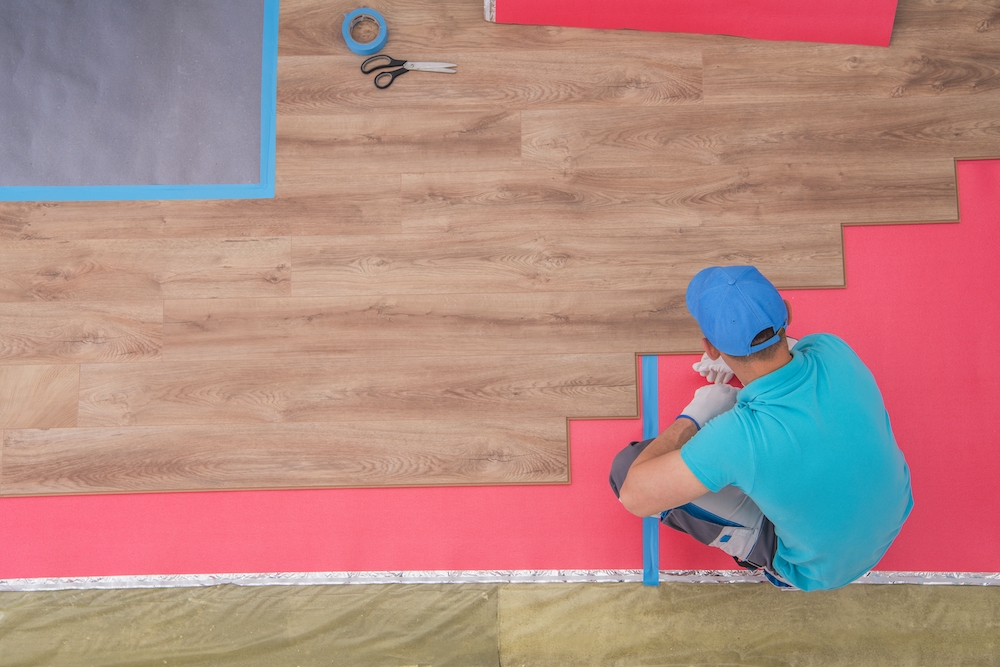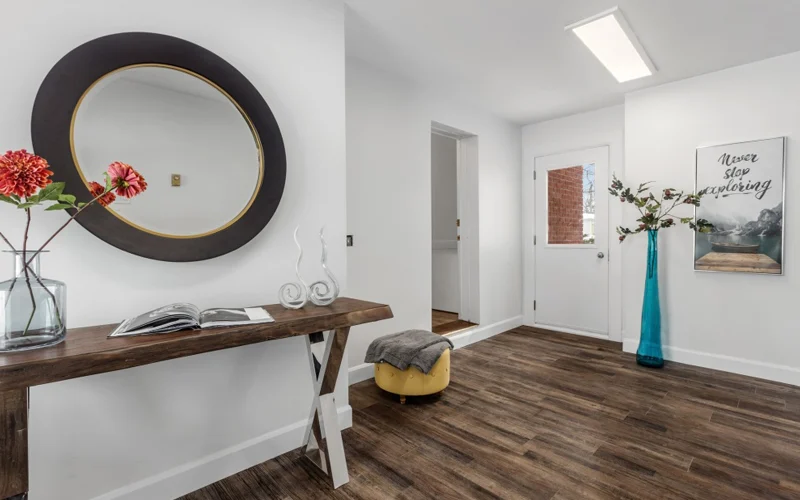When it comes to selecting flooring for your New Jersey home, there are few decisions more impactful than choosing between hardwood and laminate. Both flooring types have strong advantages, but depending on your lifestyle, budget, and aesthetic preferences, one may be more suitable than the other. The climate, household foot traffic, and even resale value of your home can all influence this crucial choice. In this blog, we’ll dive deep into the key differences, pros, and cons of Hardwood vs. Laminate, helping you make an informed decision tailored to your home.
Hardwood Creates Natural Elegance
Hardwood flooring brings a rich, organic aesthetic that’s nearly impossible to replicate. Every plank is unique, with individual wood grain and natural imperfections that give your home a warm, timeless charm. The authentic texture and appearance of hardwood offer unmatched character, making it a centerpiece in any room. Whether you prefer traditional oak or exotic maple, the visual appeal is striking and sophisticated.
Hardwood pairs beautifully with a variety of interior design themes—from rustic to modern—and can be stained or refinished to suit evolving tastes. Its prestige often sets the tone for an upscale atmosphere, contributing to a sense of permanence and luxury that’s hard to achieve with synthetic alternatives.
Laminate Offers Style and Flexibility
Laminate flooring is manufactured with a photographic layer that mimics real wood, and advancements in design now make this option impressively realistic. Homeowners can choose from a vast range of colors, textures, and patterns, allowing for tailored design solutions in every room.
Laminate fits well with busy households due to its scratch and dent resistance. It’s especially popular among families with children or pets. With quick installation and an accessible price point, it’s an excellent solution for those seeking both functionality and flair. Its modern versatility makes it suitable for nearly any aesthetic preference.
Durability in New Jersey’s Four Seasons
New Jersey experiences a full range of weather, from humid summers to snowy winters, and your floors need to stand up to those environmental changes. Hardwood floors are extremely durable when maintained well. They can last for decades, making them a long-term investment in the home. However, they are sensitive to moisture and humidity, which can cause the wood to expand, contract, or warp if not managed properly.
Laminate flooring, by contrast, is more resistant to day-to-day damage. It doesn’t scratch easily and is designed to withstand fading and impacts. This makes it ideal for high-traffic areas or rooms exposed to sunlight. While laminate is not entirely waterproof, many versions include water-resistant coatings that protect the surface from everyday spills and moisture.
Maintaining Your Floors with Ease
When it comes to upkeep, hardwood flooring demands more attention. It benefits from regular sweeping and the occasional polish to preserve its finish. Over time, hardwood may require sanding and refinishing to restore its original appearance, especially if it shows signs of wear from foot traffic or furniture movement. However, this maintenance also extends the life of your floor significantly.
Laminate flooring, on the other hand, is known for being extremely low maintenance. Simple vacuuming or sweeping, followed by occasional damp mopping with a laminate-safe cleaner, is usually all that’s needed. Its protective wear layer keeps out most stains, and there’s no need for refinishing. This ease of care is especially appealing to homeowners with active lifestyles or tight schedules.
How Flooring Feels Beneath Your Feet
The tactile experience of your flooring matters more than you might think. Hardwood feels solid and substantial underfoot, offering a warm, natural sensation that makes a room feel cozy and welcoming. It also absorbs sound better than many alternatives, helping to reduce noise from foot traffic or moving furniture.
Laminate flooring, although thinner, can be made more comfortable with the use of underlayment. While it tends to produce a hollow sound when walked on, soundproofing layers can minimize this effect. The underlayment also provides cushioning, making laminate feel softer and more forgiving on the feet, which can be helpful in kitchens or playrooms.
Environmental Considerations: Sustainability in Flooring
For eco-conscious homeowners, hardwood offers a sustainable solution—provided it comes from responsibly managed forests. Many hardwood floors are certified by organizations like the Forest Stewardship Council (FSC), ensuring that the wood is harvested using environmentally responsible practices. Its longevity also contributes to sustainability, as it reduces the frequency of replacement and waste.
Laminate, while synthetic, has become increasingly green with manufacturers embracing recycled materials and reducing harmful emissions during production. Look for options with low VOC emissions and eco-certifications like FloorScore to ensure a safer indoor environment. While not biodegradable, laminate’s durability and reduced need for harsh cleaners make it a more environmentally friendly option than you might expect.
Installation Considerations: DIY vs. Professional Fit
Installing hardwood flooring typically requires the help of skilled professionals. It’s a labor-intensive process involving nailing, gluing, or stapling planks to the subfloor, as well as a necessary acclimation period for the wood to adjust to your home’s humidity levels. Done correctly, hardwood installation ensures longevity and a high-end finish that will endure for years.
Laminate flooring, however, is well known for its ease of installation. Most systems use a click-and-lock mechanism that can be installed over existing floors without adhesives. This makes it a favorite among DIY enthusiasts. With the right tools and preparation, a homeowner can transform a room with laminate flooring in just a weekend.
Coping with Moisture: Choosing the Right Floor for the Room
Moisture management is essential in a state like New Jersey, where weather can vary dramatically throughout the year. Hardwood is best kept in rooms with stable humidity and minimal risk of spills, such as bedrooms and living rooms. Engineered hardwood provides better moisture resistance than solid hardwood, making it suitable for slightly damp areas.
Laminate, especially waterproof or water-resistant versions, is ideal for moisture-prone areas like kitchens, laundry rooms, and basements. Its protective top layer helps repel water, and tight locking systems minimize gaps where moisture can seep through. Homeowners can use laminate to enjoy wood-look floors without the vulnerability to water damage.
Flooring and Resale Value in NJ Homes
When selling your home, flooring plays a key role in a buyer’s first impression. Hardwood flooring is highly sought after and often increases a property’s marketability. Its reputation for quality and permanence adds value and can give your home a competitive edge in New Jersey’s real estate market.
While laminate may not carry the same prestige, its updated appearance and affordability still make it a worthwhile investment. Many buyers appreciate its low maintenance and durability, especially in starter homes or rental properties. When installed properly and kept in good condition, laminate flooring can contribute to a home’s visual appeal and livability.
Comparison Table: Hardwood vs. Laminate
| Feature | Hardwood Flooring | Laminate Flooring |
|---|---|---|
| Appearance | Natural wood grain, unique textures | Photographic layer mimicking wood |
| Durability | Long-lasting, can be refinished | Scratch and dent resistant but not refinishable |
| Moisture Resistance | Susceptible to moisture without treatment | Better water resistance, not waterproof |
| Maintenance | Requires refinishing, regular cleaning | Easy cleaning, low maintenance |
| Installation | Needs professional installation | DIY-friendly click-lock system |
| Comfort Underfoot | Warm, solid, quiet | Softer with underlayment, may sound hollow |
| Eco-Friendliness | Sustainable when FSC certified | Uses recycled materials, low-VOC options available |
| Resale Value | High, valued by homebuyers | Moderate, depends on appearance and condition |
Hardwood vs. Laminate: What’s Best for Your Lifestyle?
Every home is different, and the best choice depends on your specific needs. If you prioritize timeless style, long-term durability, and high resale value, hardwood flooring is a strong choice. It’s perfect for homeowners who want to make a lasting investment and are willing to maintain it.
If affordability, convenience, and variety are more important, laminate flooring offers exceptional value. Its wide range of designs and easy care make it ideal for active households. Plus, laminate’s ability to mimic hardwood gives you the beauty of wood without the maintenance demands.
Whichever option you choose, working with a trusted professional can make all the difference in quality and outcome.
Why Choose VCH Flooring?

At VCH Flooring, we bring over a decade of experience delivering professional flooring installation across New Jersey. Whether you’re leaning toward elegant hardwood or durable laminate, we guide you through every step—from selection to installation.
We provide expert in-home consultations so you can choose flooring in your actual lighting and space, eliminating the guesswork. Our trained professionals ensure precise, polished craftsmanship every time. We proudly serve Burlington, Gloucester, Middlesex, Monmouth, Ocean, Somerset, Hunterdon, and Morris counties.
We’re not just flooring installers—we’re your neighbors, and we treat every home like it’s our own.
Ready to Upgrade Your Floors?
Experience the difference with VCH Flooring. Whether you choose hardwood or laminate, our team will make sure your floors are installed with precision and care.
📞 Call us today at 8563724937
📧 Email: vchflooringleads@gmail.com
📍 Visit us: 1812 Underwood Blvd, Delran, NJ 08075
🌐 Website: www.vchflooring.com
Get your free in-home estimate now and take the first step toward beautiful, lasting floors!


